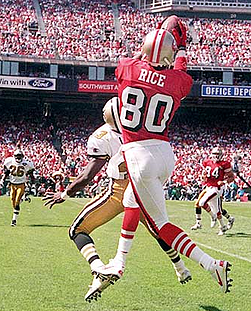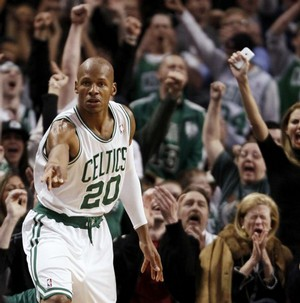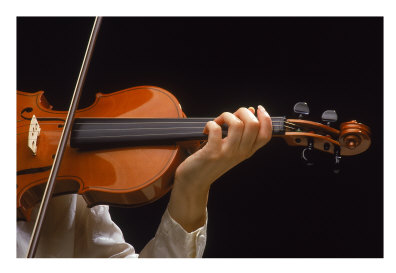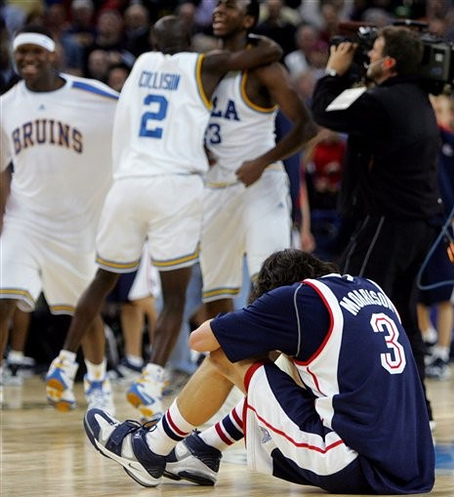by Art Horne
So your basketball season ended earlier than you had wished.
Hey, there’s always next year right?
But what makes you think that next year will end any different than this year? Sure, there’s always that touted incoming freshman that everyone is talking about, or that transfer from another school that is sure to help your team make that championship run. But freshman always take time to mature and transfers have to sit out for a year per NCAA rules. So it looks like next year starts with you – and next year starts now!
In Geoff Colvin’s book, Talent is Overrated, he points to one of the greatest NFL players of all time as an example of an athlete that overcame a lack of “talent” (many would argue that Rice was clearly the most talented wide receivers of all time) by simply outworking his opponents in the off-season.


So what made Jerry Rice so good?
1. He spent very little time playing football
a. “Of all of the work Rice did to make himself a great player, practically none of it was playing football games.” (pg. 54) It’s clear once you compare the amount of time in a game, and then more closely at the amount of time that Rice spent on the field that the time there paled in comparison to his other football “related” activities. So what does Jerry Rice and football have to do with hoops?
b. Try this on for size – many athletes always look to play as an means to improve their game, but how many shots do you get during a summer pick-up game vs. time with a teammate (coaches can’t be with players in the summer) working on your left-hand hook shot? You could probably count on one hand the number of times in an afternoon of summer pick-up games that you were able to execute a particular shot. In contrast, a specific shot can be practiced and rehearsed over and over in preparation for real time execution.
c. Pick-up games are required? Great – stop using them to run slow, argue and BS – use it as your summer conditioning and insist that you guard the opposing team’s best player each and every time. Defensive work is probably the one skill that is hardest to do (and probably impossible) on your own. Use this time with others to work on skills that REQUIRE others, and dedicate the majority of your other free time to individual skill development.
2. He designed his practice to work on his specific needs
a. “He (Rice) had to run precise patterns; he had to evade the defenders, sometimes two or three, who were assigned to cover him; he had to outjump them to catch the ball and outmuscle them when they tried to strip it away; then he had to outrun tacklers. So he focused his practice work on exactly those requirements.” (pg. 55)
b. Most athletes won’t admit that they are not good at a particular skill. It was the ref or some other outside force that kept the ball from dropping in the hoop, time and time and time again. Before working on those specific skills players must be brutally honest with themselves and admit that they don’t have a complete skill set to compete at the highest level. Sure you may be able to windmill dunk or you have a killer back-to-the-basket post move, but is your skill set complete or evolved to the point where you can make the leap to the next level?
c. A quick look at your shooting percentage at the end of the basketball season will clearly demonstrate whether you have earned the right to shoot from beyond the arc. Still think you have what it takes to play in the NBA? Grab two rebounders and shoot uncontested 3-pointers up to a hundred – if you didn’t make 75 then you need to swallow your pride, find a coach and ask him how you can improve you stroke. NBA 2-guards make 75/100 and elite shooters like Ray Allen make 80-85.

d. You’d have to play an entire days worth of pick-up games before you have an opportunity to make 75 3-pointers – very little time should be dedicated to actually playing the game if you are looking to improve a specific skill.
3. While supported by others, he did much of the work on his own
a. The collegiate basketball season starts Oct 15th with official practices and ends with the national championship the first week of April (if you’re lucky). That leaves 7 months of individual work that can be accomplished before team practices begin again. More than half the year can be dedicated to individual work and skill development.
4. It wasn’t fun
a. Basketball athletes rarely ever work on skills that they’re not good at simply because failure really isn’t that much fun. Imagine being a decent shooter, say 35% from three-land? It’s not bad, but to make it to the next level a minor tweak or change may be necessary to get your percentage above the 40% range. So you make a few adjustments and begin shooting from beyond the arc with your new and improved shooting technique – do you think you’ll shoot better or worse for the first week?
The answer is worse.
Not to mention now going through this process during a “friendly” game of pick-up with your boys reminding you that you missed again your last trip down the court.
b. Rarely will athletes work through this “learning” period, especially when they’ve experienced “success” with their previous form. If you’re going to work on a skill that you’re not great at you must first be prepared for failure – lock in and accept that it won’t be fun this summer (fun comes next season when you’re making it rain from beyond the arc!)
So looking at just one football star clearly doesn’t constitute a scientific study of any kind, and still the question remains, why are some people simply more successful at sports than others, or at any skill for that matter?
Consider a study conducted in the early nineties examining a music academy in Berlin to discover why some violinist were better than others.
The Role Of Deliberate Practice In the Acquisition of Expert Performance by Ericsson, Krampe and Tesch-Romer. Psychological Review. 1993, Vol. 100. No. 3. 363-406.

Summary points:
1. Practice Makes Perfect: When asked to rate the relevance of music-related activities and non-music-related activities to their progress towards becoming the very best, solitary practice was far and away number one.
2. The More The Merrier: Although they all knew that this practice was essential, they didn’t all do it. The two top groups, (the best and the better violinists) practiced by themselves about 24 hours a week on average. The third group (the good violinists) practiced by themselves only 9 hours a week.
3. Solitary Practice Is Essential: Each violinist recognized that the most important activity, the solitary practice was neither easy nor fun!
“When they rated activities by effort required, solo practice ranked way harder than playing music for fun, alone or with others, and harder than even the most effortful everyday activity, child care. As for pleasure, practice ranked far below playing for fun and even below formal group performance, which you might reasonably guess would be the most stressful and least fun activity.”
4. No Outside Help Needed: Although solo practice does not require outside help – no coach or instructor is needed – and thus completely in the control of the individual and almost limitless, only those that chose to practice more became excellent at their skill.
“Solo practice is unusual among music-related activities in that it’s largely within the individual’s control. Most other activities – taking lessons, attending classes, giving performances – require other people’s involvement and are therefore constrained. But with 168 hours in a week, a person can practice by himself or herself just about without limit. In fact, no one in the study came anywhere near spending every available hour on practice.
So all the violinists understood that practicing by themselves was the most important thing they could do to get better. Though they didn’t consider it easy or fun, they all had virtually unlimited time in which to do it. On those dimensions, they were all the same. The difference was that some chose to practice more, and those violinists were a great deal better.” P. 59
Summary:
As much as you’d like to believe it, practice, deliberate and focused practice isn’t much fun. You’ll experience failure many more times than success if you are truly working on skills that need improving. Whether it was Jerry Rice running stadium stairs or world class violinists practicing for hours on end, both learned to love the process of getting better and realized that failure in the moment (games or recitals) when it matters the most, is far less fun than any amount of practice.
“There are two pains in life, the pain of preparation and the pain of regret.”

Register now for our Conference on June 3-4th, 2011. Seats are limited!
